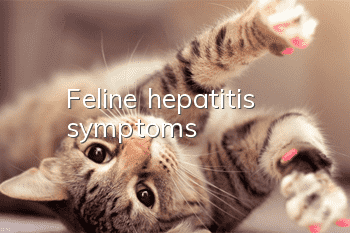Feline hepatitis symptoms

Symptoms of feline hepatitis:
1. Acute hepatitis in cats: Symptoms such as loss of appetite, lethargy, weight loss, etc. will appear, and the body temperature will be normal or slightly elevated when measured. In severe cases, vomiting and jaundice may occur. Jaundice generally manifests as yellowing of the eyes, yellow urine, and even yellowing of the skin. If the above symptoms occur, you need to take the cat to the pet hospital for examination in time, do biochemical indicators, check whether the liver indicators are abnormal, and then actively treat it.
2. Feline chronic hepatitis: It occurs for a long time. The main clinical symptoms are inactivity, easy fatigue, loss of appetite, etc., and occasionally nausea and vomiting. At the same time, jaundice may appear throughout the body.
Methods to deal with cat hepatitis:
1. Keep the environment quiet: When a cat suffers from hepatitis, a quiet and comfortable environment is very important for the cat. , because a quiet and comfortable environment can reduce the biological activity of the cat's liver and increase the blood flow of the liver, thus improving the regeneration function of the cat's liver. At the same time, the feces scraper needs to reduce/control the cat’s activities, try to reduce the tension of the cat’s liver capsule, and reduce the cat’s pain.
2. Reasonable and healthy diet: To adjust the cat’s diet, the cat needs to be provided with high-quality cat food that is rich in nutrients (including protein, vitamins, etc.) or prescription food that can treat feline hepatitis. . Because cats suffering from hepatitis need to supplement a lot of vitamins and energy, but sick cats will have a loss of appetite, so if necessary, force-feed the sick cats.
3. Reasonable use of antibiotics: Because there are many kinds of antibiotics, pet owners should use antibiotics to treat cats reasonably and appropriately, and try to choose antibiotics that are less toxic to the cat’s liver. Avoid antibiotics that are toxic to your cat's liver.
4. If a cat develops feline hepatitis due to excessive intake of anthelmintics or poisoning, an antidote is required for special treatment.
- What causes cats to lose teeth? Have you ever seen your cat lose teeth?
- What food should kittens eat before their teeth grow?
- How big can a Maine Coon cat get?
- Why do kittens keep bleeding from their eyes?
- The cat’s belly rises and falls quickly when lying on its side
- How to train a cat to use a scratching post?
- What are the symptoms of British Shorthair cats in heat?
- What is the best thing for kittens to eat when they are just born?
- What should I do if my cat is in heat and barking? Tell you how to relieve your cat’s heat
- How to give deworming medicine to cats



